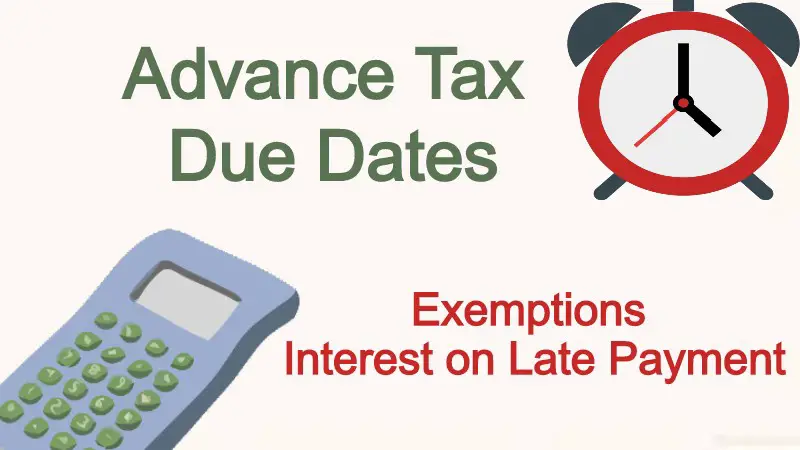Advance tax is a form of Income Tax which is paid in advance during the financial year in which the income is received rather than paying it as a whole at the end of the financial year. That means payment of tax by a person before the end of the financial year. Advance Tax is also called “Pay as You Earn Tax“. It is paid in installments during the financial year when the income is earned.
The concept of Advance Tax arises if the tax liability of a person during a particular financial year is Rs.10,000 or more. The main purpose of Advance Tax is the government will earn a constant income flow throughout the year.
For example, suppose your tax liability for the year 2019-20 exceeds Rs.10,000 then you are required to pay Advance Tax in the same year.

Advance Tax Due Dates
Advance Tax is to be paid in different installments. The due dates for different installments of advance tax are shown in below table:
For all Assessees including Individuals and Corporate taxpayers(other than assessee mention under Section 44AD & 44ADA:
| Due Dates | Advance Tax Payable |
| By 15th June | Minimum of 15% of advance tax |
| By 15th September | Minimum of 45% of advance tax |
| By 15th December | Minimum of 75% of advance tax |
| By 15th March | Minimum of 100% of advance tax |
For Assessees who have opted Presumptive taxation scheme under Section 44AD & 44ADA:
By 15th March – Minimum of 100% of advance tax.
Income liable for Advance Tax
As per Section 208, every person who estimates his tax liability exceeds Rs.10,000 during the financial year is liable to pay Advance Tax. Therefore all income earned should be included for calculation of Advance Tax.
Advance Tax is applicable to all assessees, including persons earning income by way of salary if his tax liability during the year exceeds Rs.10,000.
Who Should Pay Advance Tax
- In case of salaried employee, freelancers or Business person if your total estimated tax liability during the year exceeds Rs.10000 then you are required to pay Advance Tax.
- If the resident person is earning income from business and he is a senior citizen i.e. more than equal to 60 years then he is not liable to pay Advance Tax.
- In case of persons earning Professional Income such as Doctors, Auditors, Lawyers etc., and if they opted presumption scheme under Section 44ADA then they have to pay their advance tax in whole on one installment on March 15th or by March 31st.
- In case of persons earning business income under presumptive scheme under Section 44AD, then they are also required to pay the whole installment of Advance Tax by March 15th.
Exemptions from Payment of Advance Tax
As mentioned above senior citizen person earning income by way of business is exempted from payment of Advance Tax if he satisfies the below conditions.
- The senior citizen should be a Resident individual as per Income Tax Act. (age of 60 years or more).
- The senior citizen does not earn any other income other than Income under the head “Profits and gains of Business or Profession”.
Interest on Late Payment of Advance Tax
- Section 234C
Under this section, if a person who is liable to pay Advance tax does not pay the advance tax before the above mentioned due dates then he is liable for an interest of 1% on the tax due. This interest will be calculated from the individual cut off dates shown above till the date of actual payment of advance tax.
The amount on which the advance tax calculated should be equal to:
| Tax on Total Income | *** |
| Less: TDS | *** |
| Less: Tax relief u/s 90 or 91/Tax credit u/s115 JD | *** |
Exemption to pay Interest on Advance Tax
If there is shortfall in payment of Advance Tax due to underestimation of income or failure to estimate income from capital gain or speculative income then no interest on advance tax is payable.
- Section 234B
Under this section, if the advance tax paid is less than 90% of the assessed tax then an interest of 1% is levied. Suppose if you have not paid from the beginning of the financial year then interest is levied from April 1st of that year until the total income determined or until the Self-assessment Tax is paid, whichever is earlier.
Calculation of Advance Tax:
The format below is a basic example for how the advance tax is calculated.
| Particulars | Amount |
| 1. Income from Salary | – – – – |
| 2. Income from House property (Rental Income) | – – – – |
| 3. Income from Business or Profession
Gross receipts : – – – (-) Expenses : – – – |
– – – – |
| 4. Income from Other Sources(Commission, interest on FD) | – – – – |
| 5. Gross Total Income (Sum of 1-4) | – – – – |
| 6. Less: Deduction u/s 80, 80c, 80D etc | (- – – -) |
| 7. Total Taxable Income | – – – – |
| 8. Tax payable(as per slab rates including cess) | – – – – |
| 9. Less: TDS | (- – – -) |
| 10. Tax payable on which advance tax installment is made | – – – – |